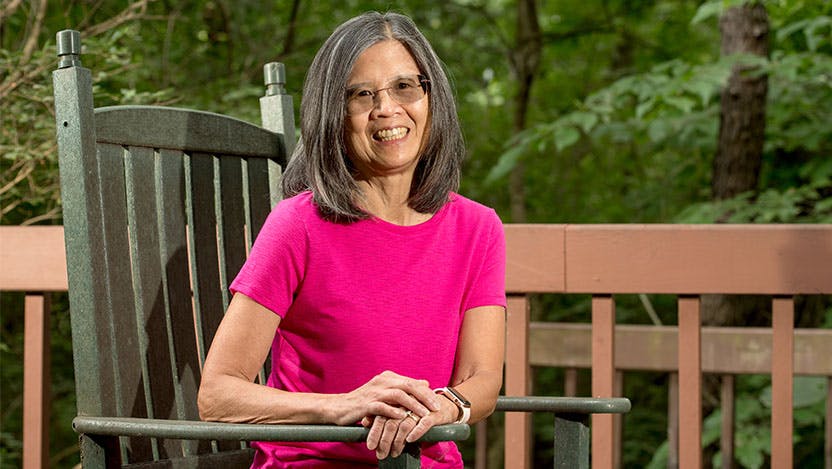Cochlear implants help a retired pediatrician hear again

When 69-year-old Pam Huang suddenly began to lose her hearing in October 2019, she felt confused. In the space of a month, it seemed as if people were speaking more and more quietly. The television always appeared to be set at a low volume.
“I kind of knew there was something going on, but at first I couldn’t believe it,” said the Burr Ridge resident.
When it comes to hearing loss, there are many possible causes in older adults. Age-related hearing loss (presbycusis) is common and caused by degradation of the tiny hair cells in our inner ear that turn sound vibrations into electrical signals for the brain. Exposure to loud sounds – such as noisy machinery, firearms or booming music concerts – can further damage these hairs.
Certain viral and bacterial infections, along with side effects from medical treatments such as radiation, platinum-based chemotherapy agents and even Viagra, also can cause hearing loss. On rare occasions, older adults can develop neurocognitive problems that impair hearing.
When Huang was hospitalized at the University of Chicago Medicine, a spinal tap showed the retired pediatrician was recovering from viral meningitis. Meningitis, which causes inflammation of the membrane around the brain and spinal cord, can additionally infect the inner ear, making hearing loss a common aftereffect. Huang was diagnosed with severe hearing loss in her right ear and profound hearing loss in her left ear. She also had very poor clarity.
"I've been exposed to viruses my entire professional life, but being on an immunosuppressive drug made me especially susceptible," said Huang, who was treated for lymphoma in 2016.
UChicago Medicine offers the full range of hearing services for adults and children, including novel audiology and hearing technology, surgically implanted bone conduction devices and management of skull base disorders and chronic ear disease. For Huang’s level of hearing loss and clarity, however, hearing aids are not effective.
That’s why UChicago Medicine otologist Terence "Ted" Imbery, MD, recommended cochlear implants, electronic devices that circumvent impaired parts of the ear. An implant stimulates the hearing nerve directly in the cochlea, the part of the inner ear shaped like a snail shell.
It takes anywhere from six months to a year to adapt to and fine-tune hearing with a cochlear implant. Working closely with an audiologist and speech language pathologist is critical.
But the COVID-19 pandemic and rehabilitation for other symptoms delayed Huang's treatment for months.
“Pam went about a whole year essentially being totally deaf,” said Imbery. “She had this awful illness that resulted in significant hearing loss, which can lead people to be socially withdrawn and isolated.”
During that time, Huang relied on a speech-to-text phone app, a captioned telephone service and writing notes to learn what people were saying.
“It was kind of a shock,” recalled Huang. “The sense of isolation really affected me and I felt like I just couldn’t communicate with anyone.”
In November 2020, Imbery performed outpatient surgery on Huang’s right ear. He made a small incision behind the crease of her ear to implant the internal hardware receiver. Then, he used a surgical drill to thread an array of electrodes through her mastoid bone and into her ear’s cochlea. A cochlear implant uses electrical signals – as opposed to the usual acoustic signals – to stimulate the hearing nerve in the cochlea.
“The surgery was relatively minor, and for a week I had to take care of the wound,” said Huang.
About two weeks later, Huang returned to UChicago Medicine so that audiologist Eric Seper, AuD, PhD, could fit the implant’s external piece, which is worn behind the ear and has a microphone that picks up sound to send to the internal implant. Huang was unsure what to expect when Seper turned the device on, knowing that the sounds she would hear through the implant would be different from those she’d heard in the past.
“It sounded garbled, kind of like bad television or audio reception,” said Huang. “If I could understand anyone, they sounded like a cartoon character.”
It takes anywhere from six months to a year to adapt to and fine-tune hearing with a cochlear implant. Working closely with an audiologist and speech language pathologist is critical.
“Patients will often say it sounds robotic, like Mickey Mouse or an alien,” said Seper. “The cochlear implant is electrically stimulating the ear in a way it has never been stimulated before, so we have to retrain the brain to hear again.”
Huang went through five months of aural rehabilitation to get her comfortable with her new hearing device. Auditory training helped her brain start to attach meaning to words and sentences again. She also listened to podcasts, and relied on closed-captioning when watching TV. Satisfied with the results, she decided to have the other ear implanted in October 2021. She continues to do very well.
Speech language pathologist Michelle Havlik, MHS, CCC-SLP, credits Huang’s dedication to optimizing her new ability to hear.
“You have to commit to wearing the cochlear implant all the time, and it has to be on and working,” said Havlik, who worked with Huang. “And you have to practice active listening daily, meaning listening with the intent to understand. You can’t be multitasking.”
Whereas previously Huang was completely deaf in one ear and near-deaf in another, she has since scored 65% on her clarity of hearing when tested with background noise in a sound booth. In quiet, she has done remarkably well, scoring up to 99%. She still prefers to use captioning with the TV and in Zoom meetings, but recently went to the movies with her husband and understood most of what was said. This transformation has been a pleasant surprise.
She went "from not being able to hear to being able to hear. I really think it was almost like a miracle.”

Terence Imbery, MD
Terence “Ted” Imbery, MD, is an otolaryngologist who specializes in otology and neurotology, the specialty of ear and hearing disorders. His expertise includes cochlear implantation, skull base surgery, aural atresia and management of chronic ear disease.
View Dr. Imbery's physician profile